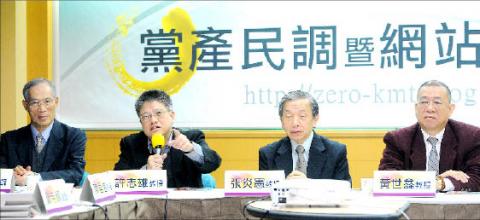More than 77 percent of respondents in a survey conducted by a polling company on behalf of the Zero Party Assets Alliance felt that the Chinese Nationalist Party’s (KMT) huge assets create unequal competition between political parties, the alliance told a press conference yesterday.
The poll, conducted on Saturday and Sunday, showed that 58.8 percent of respondents agreed that the assets of political parties should be brought to zero, with 14.3 percent disagreeing.
While 56.3 percent of people polled agreed that political parties should only use political donations and party subsidies to conduct election events, 22.6 percent disagreed.

Photo: Wang Min-wei, Taipei Times
A little more than 50 percent of respondents said that parties should not hold any shares or bonds that have value in the markets, while 28.1 percent disagreed.
In addition, 50.9 percent agreed that parties who have held large party assets for a long time were detrimental to the development of democracy, while 29.1 percent disagreed.
Almost 60 percent of respondents agreed that the KMT has had an economic advantage for a long time, with 50.7 percent of respondents saying they knew that the KMT’s assets came from taking over Japanese colonial-era assets, subsidization from national coffers and other special business interests.
A little more than 77 percent of people polled said the KMT’s possession of large party assets was unfair in the competition among political parties, while 8.6 percent said it was fair.
About 55 percent said they were dissatisfied with how President Ma Ying-jeou (馬英九), the KMT presidential candidate, has handled the KMT’s assets, while 13.5 percent were satisfied.
Ma had claimed he would sell off all party assets when he became KMT chairman in 2009, but the KMT received NT$2.9 billion (US$95,82 million) in share dividends that year.
Just over 58 percent of respondents said that political parties should not have party-run businesses or party assets, while 16.9 percent disagreed with that statement and 54.5 percent of the respondents said that only amendments to the Political Party Act (政黨法) would resolve the problems involving party assets.
Alliance convener and head of the Taiwan Association of University Professors, Chang Yen-hsien (張炎憲), said that KMT assets were an old issue, but also one that has not been resolved.
He added that because the presidential election is just over two weeks away, the issue would sharpen the focus on the inequality posed by the KMT’s party assets.
National Taipei University department of public finance professor Huang Shih-hsin (黃世鑫) said that as long as the KMT asset issue existed, normal democratic development in Taiwan would be impossible. He added that the influence of party assets was a problem in the present and the future.
Aside from publishing the poll, the alliance also collected data from an Executive Yuan Web site listing illicit party assets, which was deleted by the Ma administration, and published it on its own Web site at http://zero-kmt.blogspot.com.
Translated by Jake Chung, Staff Writer

HORROR STORIES: One victim recounted not realizing they had been stabbed and seeing people bleeding, while another recalled breaking down in tears after fleeing A man on Friday died after he tried to fight the knife-wielding suspect who went on a stabbing spree near two of Taipei’s busiest metro stations, Taipei Mayor Chiang Wan-an (蔣萬安) said. The 57-year-old man, identified by his family name, Yu (余), encountered the suspect at Exit M7 of Taipei Main Station and immediately tried to stop him, but was fatally wounded and later died, Chiang said, calling the incident “heartbreaking.” Yu’s family would receive at least NT$5 million (US$158,584) in compensation through the Taipei Rapid Transit Corp’s (TRTC) insurance coverage, he said after convening an emergency security response meeting yesterday morning. National

Taiwan has overtaken South Korea this year in per capita income for the first time in 23 years, IMF data showed. Per capita income is a nation’s GDP divided by the total population, used to compare average wealth levels across countries. Taiwan also beat Japan this year on per capita income, after surpassing it for the first time last year, US magazine Newsweek reported yesterday. Across Asia, Taiwan ranked fourth for per capita income at US$37,827 this year due to sustained economic growth, the report said. In the top three spots were Singapore, Macau and Hong Kong, it said. South

PLANNED: The suspect visited the crime scene before the killings, seeking information on how to access the roof, and had extensively researched a 2014 stabbing incident The suspect in a stabbing attack that killed three people and injured 11 in Taipei on Friday had planned the assault and set fires at other locations earlier in the day, law enforcement officials said yesterday. National Police Agency (NPA) Director-General Chang Jung-hsin (張榮興) said the suspect, a 27-year-old man named Chang Wen (張文), began the attacks at 3:40pm, first setting off smoke bombs on a road, damaging cars and motorbikes. Earlier, Chang Wen set fire to a rental room where he was staying on Gongyuan Road in Zhongzheng District (中正), Chang Jung-hsin said. The suspect later threw smoke grenades near two exits

The Forestry and Nature Conservation Agency yesterday launched a gift box to market honey “certified by a Formosan black bear” in appreciation of a beekeeper’s amicable interaction with a honey-thieving bear. Beekeeper Chih Ming-chen (池明鎮) in January inspected his bee farm in Hualien County’s Jhuosi Township (卓溪) and found that more than 20 beehives had been destroyed and many hives were eaten, with bear droppings and paw prints near the destroyed hives, the agency said. Chih returned to the farm to move the remaining beehives away that evening when he encountered a Formosan black bear only 20m away, the agency said. The bear